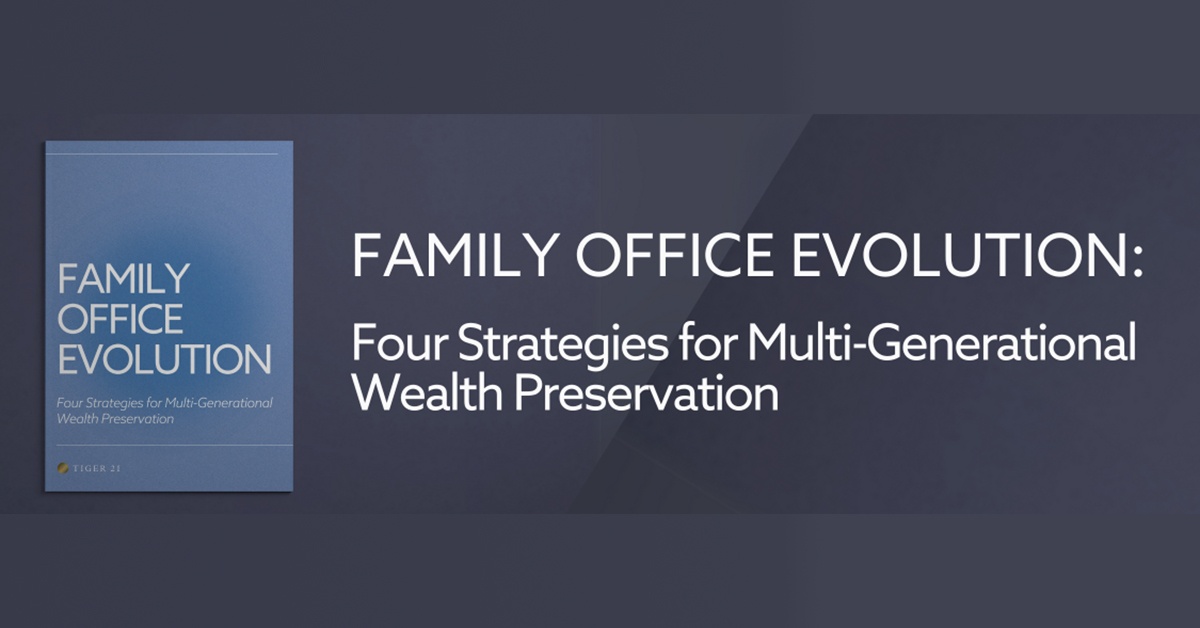5 Key Questions Every Family Office Should Ask About Governance

Governance Matters: A Blog Series by Chris Rose, TIGER 21 Family Office Chair
One of my favorite books on family office strategy is James Hughes’ Family Wealth. In it, Hughes emphasizes that wealth is about far more than money—it’s about preserving a family’s human and intellectual capital across generations. This perspective resonates deeply with me because I’ve seen firsthand how effective governance can align values, strengthen decision-making, and foster trust in family offices.
Yet, family office governance often takes a back seat until challenges arise—whether it’s a conflict, a failed succession plan, or a breakdown of communication. Inspired by Hughes’ insights and my own experiences, I’ve outlined five practical questions that every family office should ask to build a governance framework that drives clarity, accountability, and long-term success.
Five Key Questions About Family Office Governance
1. What is the purpose of your family office?
Strong governance starts with a clear understanding of why the family office exists. While wealth preservation is often the central focus, each family office’s purpose is unique—whether it’s growing the family’s assets, managing philanthropic efforts, or supporting entrepreneurial ventures.
Consider: Crafting a written mission statement to guide the family office. For example, a purpose like “To preserve our wealth for future generations, invest in sustainable ventures, and give back to our community” can inform every governance decision, from investment priorities to hiring policies.
Key Insight: Purpose serves as the family office’s North Star. Without clarity on purpose, governance frameworks risk becoming disjointed or misaligned with the family’s values.
2. How do we ensure alignment between the family’s goals and the family office’s strategy?
Even when the family shares a common purpose, differing opinions on priorities—such as investment strategy or philanthropy—can create tension. Governance structures should include processes to align the family’s goals with the family office’s strategy, ensuring that resources are allocated effectively and disputes are minimized.
Consider: Holding an annual “strategic alignment session” where stakeholders review the family office’s performance, discuss emerging priorities, and adjust strategies as needed.
Key Insight: Alignment isn’t static—it requires ongoing communication and a willingness to adapt as circumstances change.
3. How do we manage conflicts within the family?
Conflict is inevitable in any family, but in the context of a family office, unresolved disputes can jeopardize not just relationships but also wealth preservation. A formalized conflict resolution process is a critical component of family office governance.
Consider: Developing a family charter that includes clear protocols for resolving disputes, such as mediation and structured meetings.
Key Insight: Families that invest in structured conflict resolution mechanisms not only preserve relationships but also strengthen trust within the family office.
4. Are there clear rules for succession and leadership transitions?
A common challenge for family offices is transitioning leadership from one generation to the next. Governance frameworks that address succession planning not only ensure continuity but also prepare future leaders to take on their roles effectively.
Consider: Starting early by pairing younger family members with mentors or allowing them to participate in family councils.
Key Insight: Succession planning isn’t just about transferring titles—it’s about preparing the next generation to lead with integrity and vision.
5. How do we ensure transparency and trust among family members?
Transparency builds trust, and trust is the glue that holds family offices together. Regular reporting, open communication, and shared decision-making processes ensure everyone feels informed and valued.
Consider: Scheduling quarterly family assemblies to discuss progress, share updates, and align on goals.
Key Insight: Transparency isn’t just about sharing information—it’s about creating a culture where all stakeholders feel included, respected, and empowered.
The Importance of Family Office Governance
Governance is the backbone of any successful family office. By addressing these five questions, family offices can create a governance framework that fosters alignment, strengthens decision-making, and safeguards their legacy for future generations.
Strong governance isn’t a one-time effort—it evolves with the family office, adapting to new challenges and opportunities. By proactively building clarity and accountability into your family office, you can ensure its success not just today, but for decades to come.
Are you a single family office principal making multi-generational wealth decisions for your family? A TIGER 21 Family Office Group may be right for you – learn more.
About Governance Matters
In this exclusive blog series, TIGER 21 Chair Chris Rose delves into the key pillars of governance that define enduring family offices. From structuring leadership and decision-making to balancing legacy and innovation, Chris shares real-world insights and best practices drawn from years of experience guiding ultra-high-net-worth families.
Stay tuned as we explore the strategies that help family offices thrive in an ever-evolving landscape.
About Chris Rose
Chris Rose is a partner at Dentons, the world’s largest law firm, where he serves on the Global Steering Committee of the Family Office and High Net Worth Group. He has extensive experience advising ultra-high-net-worth families on governance, cross-border investments, and family office strategies. Previously, he led Dentons’ Venture Technology practice in Europe and has advised on over 300 venture and growth capital transactions. A long-standing YPO member, Chris previously ran the YPO Deal Network, facilitating billions in transactions.
About TIGER 21
TIGER 21 is an exclusive global community of ultra-high-net-worth entrepreneurs, investors, and executives.
Explore the TIGER 21 Member ExperienceMember Insight Reports










